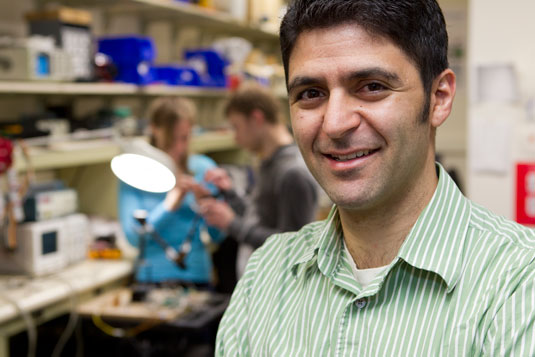Obeid puts the pieces together to engineer learning

Iyad Obeid, a faculty member in the College of Engineering, sees teaching as a form of engineering.
“When you engineer, you’re trying to solve a problem,” said the assistant professor of electrical and computer engineering, who is being honored with a 2011 Lindback Award for Distinguished Teaching. “You break it down into little pieces and try to make the pieces all fit together.
“Teaching is kind of the same thing; you have this problem, which is ‘How am I going to teach this topic?” he said. “I try to break it down like an engineer would break down an engineering problem: ‘What do the students know?’ ‘What is their background in relation to this topic?’ ‘What is the right sequence of steps to explain this topic?’ ‘Do I use examples, a lecture or a mixture of both?’ There’s really that same amount of problem solving involved in teaching as there is in engineering.”
Obeid began his teaching career while an undergraduate at MIT, where as a senior he taught several lower-level engineering courses as a teaching assistant. During his last year in graduate school at Duke University, he was hired to teach a lab class.
“I got bit by the teaching bug — I really liked it,” he said.
Although he is equally committed to research, Obeid, who joined the College of Engineering faculty in 2006, says he likes the challenge of teaching and the instant gratification it can provide.
“Research is a very different kind of reward. You could slave in the lab for a year and come up with a good result, and that’s great, but that’s a year you have to wait for a payoff on your success,” he said. “When you teach, if you really do it well, you take that feeling — that pride — away with you immediately after you’ve given your lecture.”
Plus, for him, teaching is easier than research.
“I feel with teaching I know more of what to do,” said Obeid. “I know what the answer is supposed to be, I just have to work backwards from the answer in explaining it to my students. With research, you don’t know the answer, and a lot of the times, you don’t even know what the question is supposed to be.”
While he enjoys the classroom, Obeid also enjoys teaching students working in his lab.
“That may be the most rewarding type of teaching, because those are the students I have a personal relationship with,” he said. “I may get asked a question by a student working in my lab and I work through it with them, maybe give a mini-lecture on a particular theory. I feel invested in their success.”
Obeid loves Temple students, who he describes as inquisitive and scrappy.
“We have awesome students at Temple,” he said, “and when you have awesome students, it makes awesome teaching even easier.